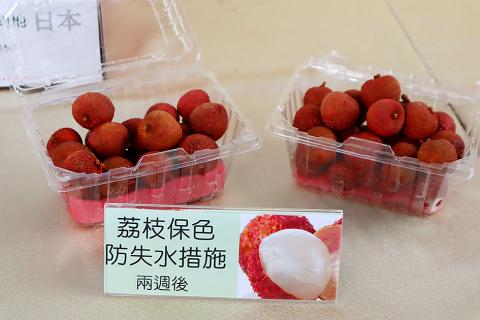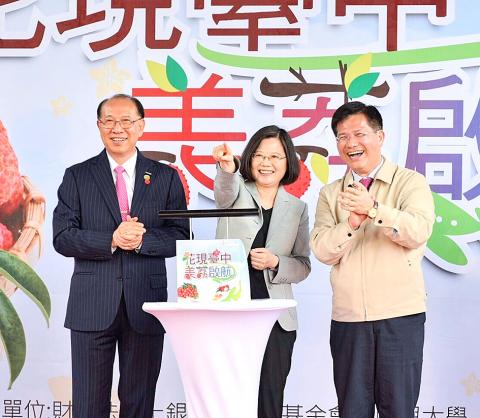Academics and Hiwin Technologies Corp (上銀科技) have developed a new technique to extend the shelf life of lychees to 30 days.
Lychees exported to Japan and South Korea previously underwent vapor treatment to eliminate pests, which darkened and dried the fruit’s skin and made it less attractive, Taichung-based Hiwin said, adding that the new technique it has developed with National Chung Hsing University horticulture professors Hsieh Ching-chang (謝慶昌) and Lin Hui-ling (林慧玲) can help keep the fruit fresh, as it retains its moisture for 30 days.
At an event on Monday marking the export of nearly 1,500 boxes of lychees treated with the new technique, President Tsai Ing-wen (蔡英文) said the new process allows the fruit to be exported fresh, calling it a testament to Taiwanese agriculture’s global competitiveness.

Photo: Ou Su-mei, Taipei Times
It is great that local businesses have collaborated to boost the nation’s agricultural diplomacy, she said, calling on Hiwin to license the technique to other municipalities.
Bananas, pineapples, mangoes and lychees are the nation’s primary fruit exports to Japan, although banana exports have fallen, Council of Agriculture data showed.
Japan imports more than 1 million tonnes of bananas each year, of which 90 percent is from the Philippines and only 1 percent from Taiwan, the council said.

Photo provided by Hiwin Technologies Corp
Taiwan’s shrinking contribution to Japan’s fruit imports can be attributed to several factors, including Tokyo’s cancelation of a generalized system of preferences for Taiwan in April 2000 and Taipei’s increase of banana export tariffs from 10 percent and 20 percent to 20 percent and 25 percent, it said.
Japan imposes tariffs of 5 percent, 3 percent and 17 percent on Taiwanese lychees, mangoes and pineapples respectively, while Taiwanese bananas are subject to a 20 percent tariff from April to September and 25 percent from October to March.
The Philippines and Japan in 2006 signed an economic partnership agreement, which lowered the tariff on Philippine bananas from 9.1 percent to 5.5 percent. That tariff dropped to zero after Japan signed a free-trade agreement with ASEAN.
Taiwan’s lack of cooling systems to extend the shelf life of fruits the main obstacle for exports, council Department of International Affairs Deputy Director-General Lin Chia-jung (林家榮) said, adding that the council plans to establish large-scale cooling systems nationwide.

BUILDUP: US General Dan Caine said Chinese military maneuvers are not routine exercises, but instead are ‘rehearsals for a forced unification’ with Taiwan China poses an increasingly aggressive threat to the US and deterring Beijing is the Pentagon’s top regional priority amid its rapid military buildup and invasion drills near Taiwan, US Secretary of Defense Pete Hegseth said on Tuesday. “Our pacing threat is communist China,” Hegseth told the US House of Representatives Appropriations Subcommittee on Defense during an oversight hearing with US General Dan Caine, chairman of the Joint Chiefs of Staff. “Beijing is preparing for war in the Indo-Pacific as part of its broader strategy to dominate that region and then the world,” Hegseth said, adding that if it succeeds, it could derail

CHIP WAR: The new restrictions are expected to cut off China’s access to Taiwan’s technologies, materials and equipment essential to building AI semiconductors Taiwan has blacklisted Huawei Technologies Co (華為) and Semiconductor Manufacturing International Corp (SMIC, 中芯), dealing another major blow to the two companies spearheading China’s efforts to develop cutting-edge artificial intelligence (AI) chip technologies. The Ministry of Economic Affairs’ International Trade Administration has included Huawei, SMIC and several of their subsidiaries in an update of its so-called strategic high-tech commodities entity list, the latest version on its Web site showed on Saturday. It did not publicly announce the change. Other entities on the list include organizations such as the Taliban and al-Qaeda, as well as companies in China, Iran and elsewhere. Local companies need

CRITICISM: It is generally accepted that the Straits Forum is a CCP ‘united front’ platform, and anyone attending should maintain Taiwan’s dignity, the council said The Mainland Affairs Council (MAC) yesterday said it deeply regrets that former president Ma Ying-jeou (馬英九) echoed the Chinese Communist Party’s (CCP) “one China” principle and “united front” tactics by telling the Straits Forum that Taiwanese yearn for both sides of the Taiwan Strait to move toward “peace” and “integration.” The 17th annual Straits Forum yesterday opened in Xiamen, China, and while the Chinese Nationalist Party’s (KMT) local government heads were absent for the first time in 17 years, Ma attended the forum as “former KMT chairperson” and met with Chinese People’s Political Consultative Conference Chairman Wang Huning (王滬寧). Wang

CROSS-STRAIT: The MAC said it barred the Chinese officials from attending an event, because they failed to provide guarantees that Taiwan would be treated with respect The Mainland Affairs Council (MAC) on Friday night defended its decision to bar Chinese officials and tourism representatives from attending a tourism event in Taipei next month, citing the unsafe conditions for Taiwanese in China. The Taipei International Summer Travel Expo, organized by the Taiwan Tourism Exchange Association, is to run from July 18 to 21. China’s Taiwan Affairs Office spokeswoman Zhu Fenglian (朱鳳蓮) on Friday said that representatives from China’s travel industry were excluded from the expo. The Democratic Progressive Party government is obstructing cross-strait tourism exchange in a vain attempt to ignore the mainstream support for peaceful development